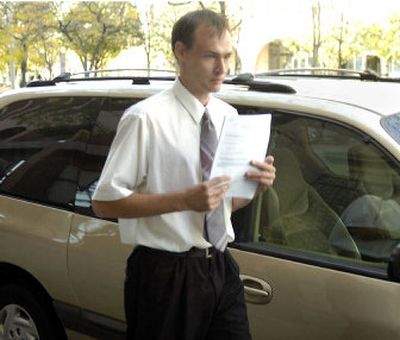Fraud conspiracy admitted

The man who designed and maintained 125 phony online university and high school Web sites for a Spokane-based diploma mill pleaded guilty Tuesday to federal conspiracy and child pornography charges.
Kenneth Wade Pearson’s plea in U.S. District Court was part of a deal that should guarantee him less prison time in exchange for his “substantial assistance” in helping federal prosecutors convict the alleged ringleaders, Dixie and Stephen Randock, of Colbert.
The case involved the paying of substantial cash bribes to Liberian diplomats, including one hand-off that was caught on video in a Washington, D.C., hotel room by U.S. Secret Service agents.
The Liberian “Board of Education” was offering accreditation for the online diploma mills in exchange for the bribes, federal court documents say.
Pearson, the 31-year-old webmaster for the scheme, pleaded guilty to conspiracy to commit wire and mail fraud and receipt of child pornography. He became the third of eight defendants who have struck deals to testify against their former associates.
“Do you plead guilty because you are guilty?” Judge Lonnie Suko asked Pearson, who stood in court with his two attorneys, Toby McLaughlin and Gloria Finn Porter.
“Yes, sir,” responded Pearson, a slender man in a white shirt and tie.
The federal judge postponed Pearson’s sentencing to December 2007, two months after the scheduled trial date for the Randocks and three other remaining defendants. Pearson likely faces three to five years in prison if he cooperates.
He was released on a $10,000 unsecured bond that he posted after he was indicted one year ago.
A task force of state and federal agents served search warrants in August 2005 after the diploma mill investigation was kicked into high gear because many of the phony degrees were being sold to buyers in Saudi Arabia, raising concerns for U.S. Homeland Security officials.
When investigators examined four computer hard drives taken from Pearson’s home near Hillyard, they found not only evidence of the diploma mill, but more than 10,000 images of child pornography.
Some were pictures of children younger than 12 and “portrayed sadistic and masochistic conduct,” Pearson admitted in the plea agreement.
Court documents filed as part of Pearson’s guilty pleas also say he unsuccessfully attempted last year to get Dixie Randock interested in selling “adult Internet pornography.”
She and the other defendants face no child-pornography-related charges, but they are accused of federal money laundering charges associated with almost $2 million generated from the scheme.
Pearson admitted that between September 2002 and August 2005, he “joined a conspiracy” with the Randocks, Heidi Kae Lorhan, Amy Leann Hensley, Roberta Lynn Markishtum, Richard John Novak and Blake Alan Carlson “to operate so-called ‘diploma mill’ universities that were falsely accredited and sold fraudulent degrees.” Novak and Carlson previously pleaded guilty and will be prosecution witnesses.
“During this period, the diploma mill universities run by the Randocks sold approximately $1.9 million in fraudulent academic products to thousands of persons located in the United States and other locations,” Pearson’s plea agreement says.
“These products included college and graduate-level degrees and fabricated academic transcripts,” it said.
Pearson and the others carried out the conspiracy by establishing the diploma mill university Web sites on the Internet, sending out bulk e-mails to potential consumers, then selling them phony degrees, printed in Spokane and Post Falls.
The plea agreement says Pearson accessed legitimate university Web sites and copied course names to “fabricate and sell transcripts” from diploma mills operating under such names as Saint Regis University, James Monroe University and Robertstown University.
“The fraudulent academic products were sent to the victim-consumers via the U.S. Postal Services or commercial interstate carriers,” triggering the mail fraud counts.
Federal prosecutors handling the case, Assistant U.S. Attorneys George Jacobs and Joseph Harrington, have not revealed the list of approximately 6,000 purchasers.
But Pearson’s plea agreement says those who bought the bogus degrees include firefighters and military personnel, among others, who used their enhanced educational portfolios to win job promotions and pay increases.